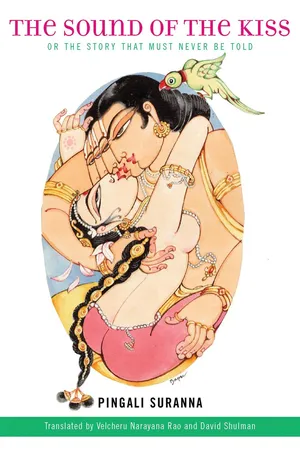![]()
[ Dvaraka City, Where the Story Begins ]
Treasure trove of fortune
where knowledge grows to fullness,
where Krishna plays at pleasure,
Dvaraka, the city that has everything,
sits like a fully grown daughter
on the lap of the Ocean, caressed
by his waves. When a father touches
his daughter, no matter how old she may be, no one takes it amiss.
Rays of light reflected from the golden palaces
reached into the sky like hands pulling at the great
city of the gods, and the vast bustle in the streets
was a challenge hurled at this heavenly rival
to come down and acknowledge
that brilliant Dvaraka was best.
In a riot of color, the walls of its fortresses were smeared with dark musk;
its gardens were always in full bloom; gleaming doves nested
on the cornices of tall palaces fashioned from sapphire and gold,
their porches raised from emerald bordered by red coral.
Students joke about their teachers, who don’t practise
what they preach. For example, they tell you never to make love
at sunset. But every day at this hour, when the sun burns
on the waves, you can see the goddess of the city
reflected in the water, her arms wound tight
around the god who lies upon the ocean1
and who won’t let her go.
Here there were Brahmins, gods on earth, who had taken in
all four Vedas and reached the end of all six schools of thought,
who lightly walked the paths of rituals for home and the world
as they focused on the first light
that is God, that only the inner eye can see.
And there were soldiers, expert in all the arts of war,
whose highest pleasure was the feeling that the goddess of victory
was scratching their breasts with her fingernails every time
they were hit by an enemy weapon. They were famed
for their generosity, more lavish than wishing trees; deep and proud,
they were masters of the land.
Merchants in this city put Kubera, the gods’ banker,
to shame. Besides all the wealth that their fathers
had set aside, they earned vast riches
on their own account and saved it all
in secret caches underground, marked by
a cobra’s hood above.
Sudras lived happily in their homes
with every form of wealth
and served the Brahmins, as the books prescribe.
They were all honest people.
Women of pleasure happily plundered their customers.
You could hold their waist between your fingers, but their breasts
and buttocks were heavy and full, their hair long and voluptuous.
Eyes radiant, they walked with an elephant’s measured grace,
their faces beckoning with a smile.
Men walking in the street by the courtesans’ tall palaces
would stop to listen, thrilled, for the doves nesting in the eaves
had learned to imitate the soft moans of the women making love
with customers who came to them each night
from heaven.
Why say more? Krishna himself lived here with his 16,108 wives,
all madly in love with him. Imagine how happy he must have been.
Did he have anything as good in heaven?
[ Kalabhashini on the Swing and Rambha in the Sky ]
In that city lived a girl, in the full bloom of youthful grace. Her father was a famous actor. Her name was Kalabhashini, which means “sweet spoken,” but that doesn’t quite express just how charming and subtle were her words. She was totally irresistible. With her refined musical talent, her gift for dancing, and her consummate skill in making love in inventive ways, she quickly began to steal both the hearts and the hard cash of her young lovers.
One day this splendid woman went out with her girlfriends and servants to play in a garden at the edge of the city. She was wearing her finest, and it was springtime, a riot of blossoming flowers. The girls were bantering and teasing one another as they reached the garden that was exploding into lush color. At first they busied themselves picking flowers. “Look at that young ponna tree,” said one, when her girlfriend’s sari was caught by a branch. “That’s how a lover should be—direct, hands on.”
“The breeze has broken apart the branches of the kuravaka tree, and now it looks like a lover spreading his arms to embrace you. He’s really trying hard. It’s not fair to turn away.”
“That mango tree is like a man who won’t give up,” said another. “He’s pulling at your sari with his branches. And what you think are bees hovering around are actually his dark eyes, staring at your breasts. What are you waiting for? You can say yes to him by accepting the fruit and flowers he’s offering.”
The sweet fragrance of their breath mixed with the fresh fragrance of the flowers hanging from their hair, already coming loose. They walked languorously, a little tired, and the heaviness of their breasts and buttocks slowed them down still more. Their belts, tied just below the soft folds of their waists, glistened with beads of sweat in the sunlight. Bracelets and anklets jingled in harmony as they walked, adjusting the saris that were slipping from their shoulders. They were giggling and aroused. When they had finished with the flowers, they moved on to play on the swings.
At that time a gandharva named Manikandhara, who had devoted himself to Narada out of his love for music, came walking through the sky along with this great sage, on his way to serve Krishna in Dvaraka. Amazed by the exuberant freedom of the women, Manikandhara said to Narada:
“Look at these startling young women.
Their legs stretch straight up to the sky.
They’re so sure of their looks, they’re making bets
to see who can swing highest.
It looks like they’re itching to fight2
the famous beauties of heaven.”
Narada answered:
“Yes. You speak like a true poet. I’ve never seen
such beauty. Your thoughtful description
is just right. Pumping and stretching their legs
on the swing, they might just kick the heads
of women in the sky.
“As he was speaking, Rambha heard him clearly as she was passing through the clouds with her handsome lover, Nalakubara, in a flying chariot. She listened; she began to burn a bit inside; her mood changed. She knew it was Narada, but she didn’t want to show her feelings. So, as if unperturbed, she turned to her lover and said, “Did you hear that? Judging by his words, he must be Narada, the sage who lives on quarrels. I’d like to greet him properly before we pass.”
Narada looked in the direction of this voice. “Seems somebody’s coming,” he said. At that moment their vehicle emerged out of the clouds, like the morning sun rising over the eastern mountain. Rambha and Nalakubara navigated their chariot right under the sage’s feet. Very gently, they touched their heads, redolent of parijata blossoms, to his feet. They stood still for a little while. He blessed them: “Love one another, with a love that never goes away.”
Rambha smiled. “Thanks for your blessing. Maybe now his love will last. But don’t you think he might just fall for the wiles of these, um, human women?” She couldn’t help showing she was miffed.
Narada didn’t quite fathom her sarcasm. “What do you mean?” he asked, standing there in the air.
“If you would step into our vehicle, we can talk as we go,” she said. “You needn’t interrupt your journey. How often do we get the chance to attend upon such great people?”
They brought both Narada and his disciple into the chariot. Standing on either side, Rambha and Nalakubara gently fanned them. Then she said, “What was it you said a moment ago to your disciple about those women on the swings? Would you please say it again?”
So Narada gave a little smile and said,
“Yes. You speak like a true poet. I’ve never seen
such beauty. Your thoughtful description
is just right. Pumping and stretching their legs
on the swing, they...

